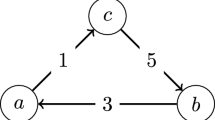Abstract
“Independence of clones” is a generalization of the condition of not being subject to the perverse consequences of vote splitting that arise under plurality voting. A new voting rule that is at least “almost always” independent of clones is obtained by the following algorithm: Require the collective ranking of the candidates to be consistent with the paired comparisons decided by the largest and second largest margins, and then, if possible, with the paired comparison decided by the third largest margin, and so on. The advantages of this “ranked pairs” rule over previously proposed voting rules that are independent of clones is that it possesses Condorcet consistency, non-negative responsiveness, and “resolvability” (the property that every tie be within one vote of being broken).
Similar content being viewed by others
References
Arrow KJ (1963) Social choice and individual values. Yale University Press, New Haven
Black D (1958) The theory of committees and elections. Cambridge University Press, Cambridge
Brams SJ, Fishburn PC (1978) Approval voting. Am Pol Sci Rev 72:831–47
Chaudhuri A, Roy D (1984) A nonproliferation criteria for a good voting scheme. Hooghly Mohsin College, Chinsurah, W.B., India
Condorcet (1785) Essai sur l'application de l'analyse à la probabilité des décisions rendues à la pluralité des voix. Paris
Coombs CH (1964) A theory of data. Wiley, New York
Doron G, Kronick R (1977) Single transferable vote: an example of a perverse social choice function. Am J Pol Sci 21:303–11
Kemeny J (1959) Mathematics without numbers. Daedalus 88:571–91
Fishburn PC (1973) The theory of social choice. Princeton University Press, Princeton
Schwartz T (1986) The logic of collective choice. Columbia University Press, New York
Tideman TN (1986) A characterization of majority rule with multiple extensions. Soc Choice Welfare 3:17–30
Tideman TN, Tullock G (1976) A new and superior process for making social choices. J Pol Econ 84:1145–59
Young HP (1977) Extending Condorcet's rule. J Econ Theory 16:335–53
Young HP (undated) Condorcet's rule. School of Public Affairs, University of Maryland, College Park
Zavist T (1986) Toward consensus. 2415 Tangley, #10, Houston, Texas 77005, USA
Author information
Authors and Affiliations
Additional information
I am indebted to Jaques Crémer, Amoz Kats, Martin Ricketts, Thomas Schwartz and an anonymous referee for helpful suggestions.
Rights and permissions
About this article
Cite this article
Tideman, T.N. Independence of clones as a criterion for voting rules. Soc Choice Welfare 4, 185–206 (1987). https://doi.org/10.1007/BF00433944
Received:
Accepted:
Issue Date:
DOI: https://doi.org/10.1007/BF00433944




